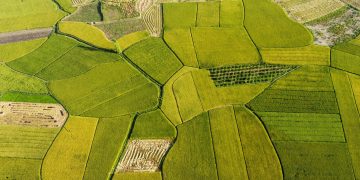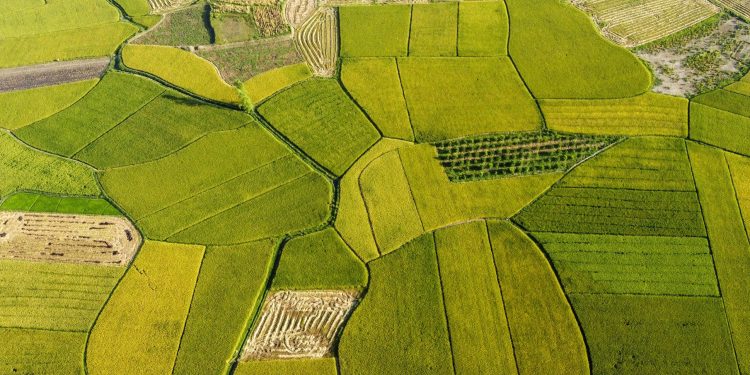The area under cultivation in Spain remained stable in 2022, with a total of 16,830,738 hectares, just 0.42% less than in the previous year, according to the provisional data of the Survey on Areas and Crop Yields of Spain (Esyrce), published by the Ministry of Agriculture, Fisheries and Food.
The area dedicated to farmland has a slight decrease. In 2022 it stood at 16,830,738 hectares (ha), 71,683 ha less than in 2021 (-0.42%). Of this total area, 11,309,264 ha correspond to arable land, 5,375,463 ha to woody crops and 146,011 ha to other arable land.
Arable land
The arable land area includes arable crops and fallows. Arable crops, as well as fallow land, have decreased their area due to the decrease in cereals and vegetables, mainly. In contrast, the increase in the area of industrial crops by 22% compared to 2021 stands out, mainly as a result of the strong increase in the area of sunflower and rapeseed. In the tuber group, there was an increase of 10.61%, which in absolute terms means just over 5,000 ha more surface area than in 2021.
Of particular note is the 22% increase in the area of industrial crops compared to 2021, mainly due to the strong increase in the area of sunflower and rapeseed
In the cereals group in general, there was a decrease of 3.64% as a whole. With the exception of wheat, the surface area of all winter cereals decreases. Rice and maize have the smallest surface area of the last 18 years, probably as a result of the situation caused by the drought suffered during the campaign. Sorghum, despite the strong percentage increase, does not reach the 3,000 ha increase in absolute value.
Rice and maize have the smallest area of the last 18 years, probably as a result of the situation caused by the drought suffered in the campaign
Grain legumes are, along with industrial crops and tubers, the group of arable crops that increases their area compared to the previous year. Highlights are the increase in lentils, yeros and dried beans. It is followed by dried peas and vetch grain. On the contrary, lupins lose more than 76% of the surface area compared to 2021, going to previous years’ levels after the strong increase of the last campaigns.
Industrial crops are the crop group with the largest percentage increase in surface area in 2022. Sunflower and rapeseed increase by more than 200,000 ha as a whole. However, irrigated crops show a sharp decline as a result of the drought suffered. The industrial tomato loses more than 41% of the surface area compared to 2021, which together with sugar beet and cotton represent a decrease of about 25,000 ha. The tobacco area reaches the lowest surface area figure of the last 18 years, with a loss of cultivation of 25% compared to 2021.
In the forage plants group, the total area decreased by 0.87%, highlighting alfalfa, forage corn and others destined for forage, among which are beetroot and turnip, cabbages and collards and other weeding plants. Only forage vetch and other forage cereals increase the area compared to last year.
The group of vegetables and flowers is the one that decreases the most within the arable crops, with an 8.86% decrease compared to 2021. It is important to note that, due to the timing of the first ESYRCE field visit, the results of horticultural crops cannot be collected in full in this report regarding the provisional Survey data in 2022.
The group of vegetables and flowers is the one that decreases the most within the arable crops, with an 8.86% decrease compared to 2021
Fallow farmland shows a slight decrease as a whole of 2.01% compared to 2021. It is remarkable the gradual increase in recent years of lands with irrigation infrastructure that have been found without planting at the time of the visit.
Woody crops
In the group of woody crops, it is noteworthy the progressive increase of practically all the species of the group, except vineyard, olive grove and other woody ones. Vineyard and olive grove descend very slightly, dragged down by the descent of the grape for wine making and olive for oil, respectively.
Among other woody crops, the carob tree shows a greater percentage decrease. As a whole, woody crops increased their surface area by 0.27% compared to 2021 and the increase in non-citrus fruit trees stands out. Among these, almond and pistachio are the ones that grow the most, followed, to a lesser extent, by peach-nectarine and avocado. Within the citrus fruit trees increase orange and lemon tree. Regarding the non-citrus fruit trees, the apple tree, persimmon, kiwi and mango, among the subtropical ones, and hazelnut in nuts, descend.
Almond and pistachio are the ones that grow the most, followed, to a lesser extent, by peach-nectarine and avocado
Esyrce
This survey is based on a field research, in which since 1990 information is taken directly at the plot level in a georeferenced sample of the national territory in the months of May to September, with more than 200 professionals who collect data directly throughout the national territory.
A source: https://valenciafruits.com































